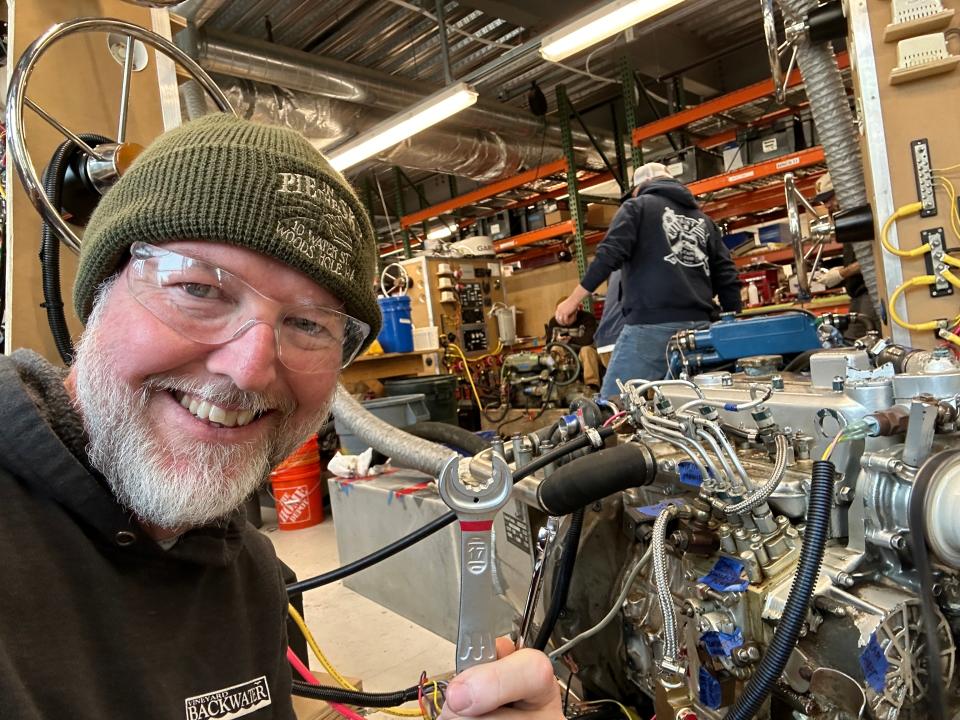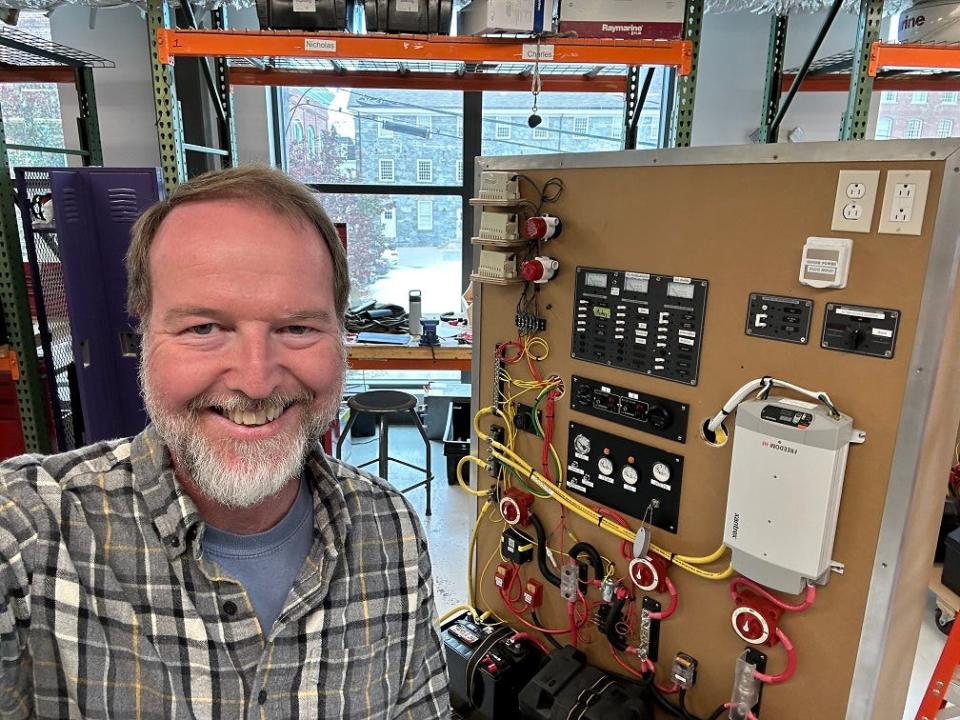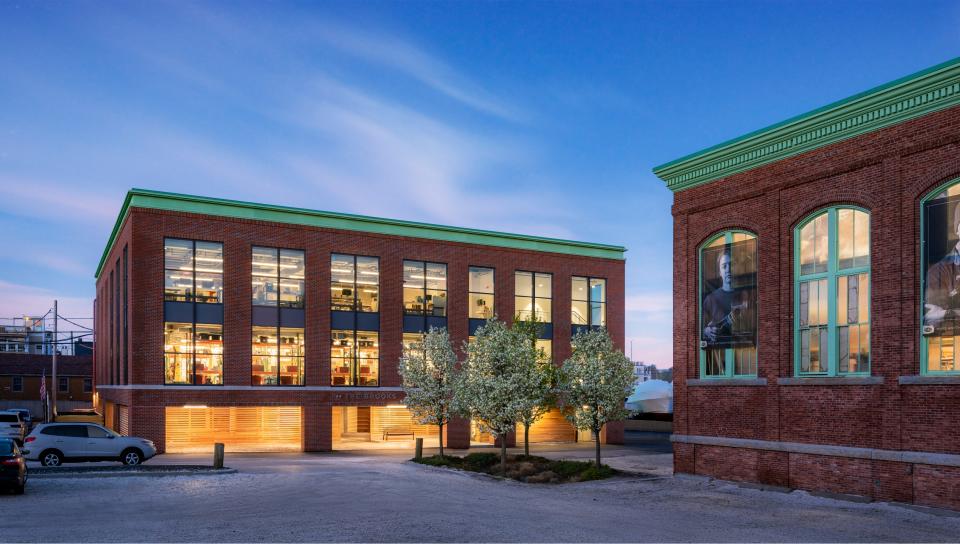STEM skills at work: International Yacht Restoration School offers chance for second career
NEWPORT – Full-time teacher to full-time student? Seeking a new career at age 55?
Nick Willis of Providence didn't rush into this life-altering decision. He said he and his wife, nurse practitioner Heather Glenn, like to carefully weigh all factors before making their decisions. In this case, once they put all relevant information on the scale, the decision, while pushing them a tad out of their comfort zone, was clear.
This past September, with a long career as a software engineer for Raytheon and, most recently, two very satisfying years teaching mathematics at the Blackstone Academy Charter School in Pawtucket in his rear-view mirror, Willis showed up at the IYRS School of Technology and Trades, enrolled in its six-month Marine Systems program.
He recently completed the on-campus program and is now honing his electrical systems drafting skills, and making a few dollars again, in the school's externship program.
Willis said he had a “great career” at Raytheon and labeled Blackstone Charter teaching the best job he's ever had. He said the students were amazing, the faculty passionate, and the leadership committed to maintaining “a wonderful school." Leaving BACS was not done without emotion.
“IYRS really tugged at my heart, though, and I felt it would create an opportunity in the future to be teaching something a little bit more pragmatic than factoring quadratic equations,” Willis said. “There's a lot of talk about the importance of STEM. Well, if you want STEM, you need look no further than a marine diesel engine or electrical system.”

How the International Yacht Restoration School programs work
IYRS was founded, in 1993, as the International Yacht Restoration School. Founders Elizabeth Meyer and John Mecray envisioned a a true wooden boat restoration program. The school over three decades has grown to now offer four programs of study – boat building and restoration (20 months), composites technology (9 months), digital modeling and fabrication (9 months), and marine systems (6 months). All four programs have been accredited by the Accrediting Commission of Career Schools and Colleges.
According to Julia McCann, IYRS director of marketing, the majority of the school's students are career changers, and the externship program is a key component of making the switch effective for students. She noted that IYRS collaborates with highly-regarded industry partners for both externships and job placement. Students and alumni can access the IYRS job portal. The school, she said, has an 85 percent job placement average for grads, with hobbyists accounting for a portion of the 15 percent.
“IYRS graduates typically excel fast in their new careers,” she said, “rising to new roles and opportunities with their employers.”
More: RIC's cybersecurity institute plans to grow with AI courses and new 'cyber range'
In a blog post on the IYRS website, Willis noted that marine systems students enjoy multiple field trips to boat yards, electronics shops, and suppliers and get to hear from guests speakers and enjoyed a career day filled with employers from Maine to California. One day, he said, three vice-presidents from nationwide Safe Harbor Marinas visited the students. The students, he said, also had the pleasure of Al Thomason, co-founder of engine-base charge control company Wakespeed, spending a day with them.
The IYRS' very concentrated education model – essentially five full work days per week – rapidly takes students from Day 1 to work force ready. Willis said that with their savings and his wife's income and some spending adjusting when needed, they were able to financially handle his paying for school and being out of work for half a year. They saw it and now see it as a wise investment. He described his wife as “incredibly supportive” during the new career adventure.

Students of all ages and experience levels
Willis said his fellow IYRS students included those right out of high school as well as people retiring from the Navy and Coast Guard. He said he immensely enjoyed the support of his cohorts. Some of his fellow students are taking a career paths to Maine, to the Caribbean, with others sticking around to help continue the state's history of master boat building.
Willis said he was experiencing some nerves leading up to his back-to-school start date. Those nerves were soothed, he said, on Day 1 when IYRS brought all the students into the boat building and restoration area and emphasized the inclusive school culture. That, he said, was followed by two weeks of message reinforcement.
“They could write the book on what it takes to create a safe learning environment, and I don't just mean safety with tools, although they are good at that, too,” he said.

Combining technical knowledge with practical skills
Born in England and raised on Massachusetts' North Shore, Wills said that while he lived most of his life near the ocean, his passion for boats and the maritime world did not surface until 2020. Due to COVID, he and his wife were itching for outdoor activities. They took sailing lessons. (“She enjoys it, I'm a bit of a nut about it,” he said.). They subsequently bought a 37-foot sailboat built in 1999.
When he was teaching algebra and pre-calculus at Blackstone Valley Charter School, Willis said that when he showed students pictures of some of the electrical work he was doing on his boat, some of them said they weren't smart enough to do such work. Wills said he knew his students were plenty smart enough, and got him thinking seriously about IYRS and that perhaps what he really should be doing is helping children connect into the maritime trades.
That dream still lives.
“I am exiting the Marine Systems program with what I feel is world class fundamental skills as a marine electrician/mechanic,” he said. “There is huge demand out there for this, with the opportunity to become highly skilled and specialized.
“I still want to teach, and eventually would like to be involved in a 'semester-at-sea' style program that is accessible to kids who may not have had the chance to be out on the water, and also includes a maritime trades element in the curriculum.”
Want to be a guide?: Newport Historical Society tours are expanding to meet demand
The cost of the marine systems program starting in the fall is about $25,700. Federal financial aid and other grants and scholarships are available.
Willis said the starting pay for marine systems graduates ranges from $25 to $30 per hour. He said he plans to work part-time and then enter the IYRS' 20-month Boatbuilding and Restoration Program. Local boat builders, he said, have told him marine systems plus BBR is a “highly desirable combination.”
“Nick’s story,” McCann said, “is typical in that most of our students are seeking to align a passion or interest to work with their hands with a way to earn a living or follow through on a life-long dream. In Nick’s case, he was initially looking to combine his love of teaching with his passion for sailing. After completing IYRS’s marine systems program, he is exploring other opportunities that he wasn’t aware of prior to enrollment.”
This article originally appeared on The Providence Journal: International Yacht Restoration School offers chance for second career

